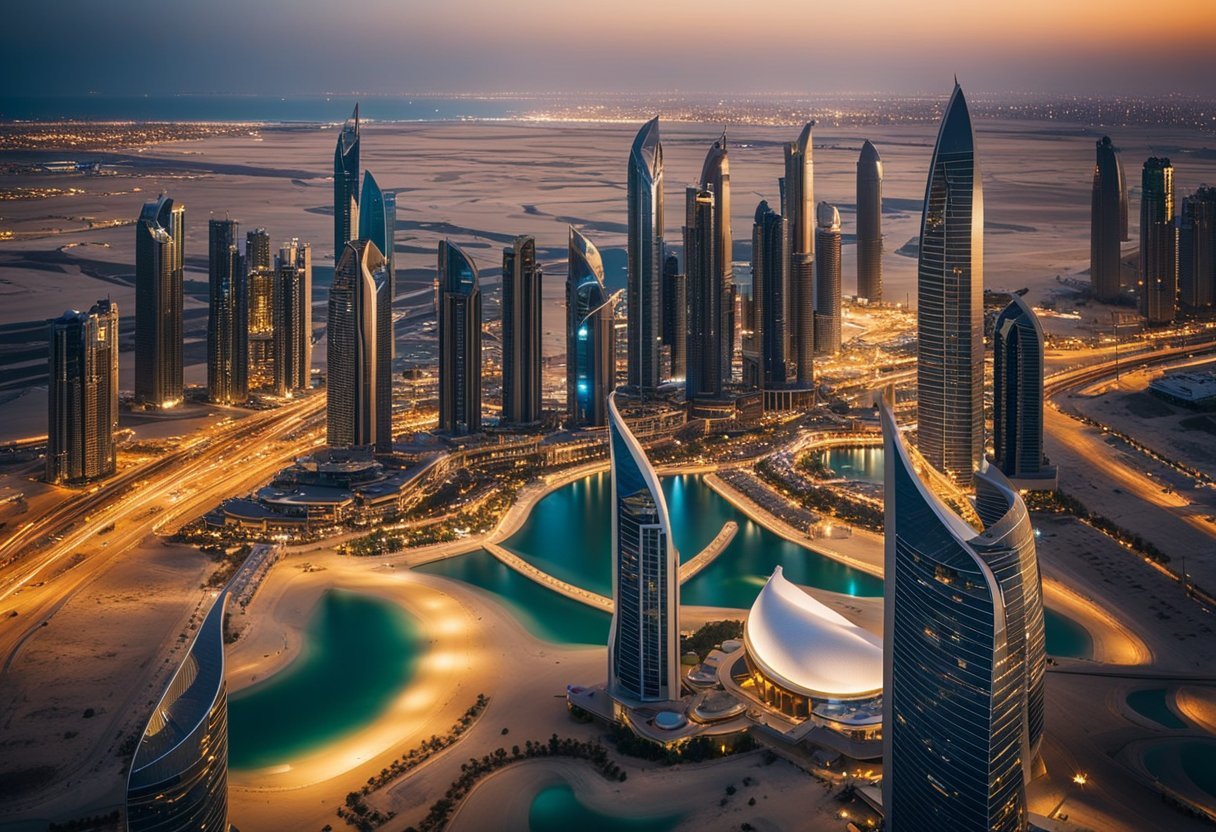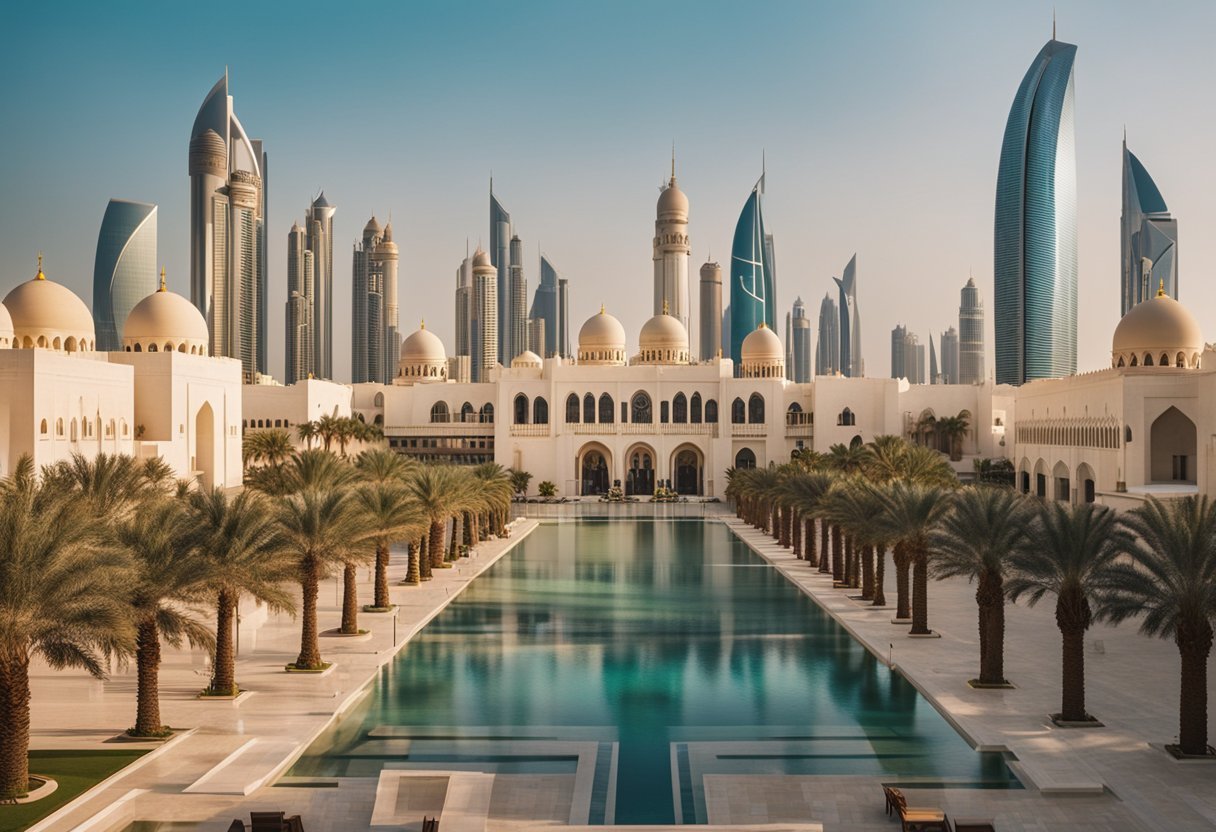مدينة أبوظبي العاصمة - استكشاف قلب دولة الإمارات العربية المتحدة
Abu Dhabi, the capital city of the United Arab Emirates (UAE), is a pivotal hub of political, cultural, and economic activity in the region. It is on a T-shaped island extending from the central western coast into the Persian Gulf.
As the largest emirate by area and the second most populous city in the UAE after Dubai, Abu Dhabi is the country’s vibrant centre of administration and government.

The city boasts an impressive skyline, characterised by modern architecture that illustrates its rapid development and economic growth.
As the seat of the UAE government and home to the President of the UAE, Abu Dhabi encapsulates a unique blend of traditional Arabian culture and forward-looking vision. The emirate has invested heavily in infrastructure, arts, and education, demonstrating a commitment to fostering a bright and sustainable future.
Abu Dhabi Capital City – Key Takeaways
- Abu Dhabi is the capital city and political heart of the UAE.
- The city harmonises rich cultural traditions with contemporary advancements.
- Infrastructure in Abu Dhabi reflects a significant investment in future growth.
السياق التاريخي

Abu Dhabi’s past is a fascinating tapestry of culture, politics, and transformation. This section will guide you through the pivotal stages of development and the profound impact of the Nahyan family.
Founding and Growth
In the late 18th century, the area now known as Abu Dhabi was a small fishing village under the dominion of the Bani Yas tribe. The city’s name, “Father of Gazelle,” suggests the abundance of wildlife that early settlers might have encountered on the island. Your understanding of Abu Dhabi’s emergence as a city is intertwined with the discovery of fresh water on the island, catalysing its initial growth.
With the discovery of petroleum in the mid-20th century, Abu Dhabi underwent an economic metamorphosis, transitioning from a quiet fishing village to a bustling, modern metropolis, further solidified by its status as the capital of the United Arab Emirates.
The construction of the Sheikh Zayed Bridge, an architectural marvel and a symbol of connection to the mainland, captures the acceleration of development.
Influence of the Nahyan Family
ال Nahyan family, a branch of the Bani Yas tribe, has been the seminal force shaping Abu Dhabi. From their rise to power in the 18th century, the family has steered the city through strategic partnerships, including a truce with بريطانيا العظمى, which established the Trucial States and set the stage for the region’s future stability.
Under the guidance of Sheikh Zayed bin Sultan Al Nahyan, widely respected for his visionary leadership, Abu Dhabi saw unprecedented growth in infrastructure, public welfare, and cultural patronage. This period he also marked the unification of the emirates, with Abu Dhabi playing a central role due to its wealth from oil revenues, thereby embedding the Nahyan family into the very heritage of the UAE.
In your exploration of Abu Dhabi’s history, you’ll find the Nahyan family’s legacy ingrained in its modern architecture, thriving cultural scene, and significant contributions to the UAE’s international relations.
المشهد الاقتصادي

The economic engine of Abu Dhabi is strongly tied to its substantial oil reserves, which have historically propelled its gross domestic product (GDP). However, efforts to diversify investments into various sectors signify the emirate’s forward-looking strategy.
Oil and Energy
Abu Dhabi is synonymous with oil and energy, underpinned by the emirate’s position as home to some of the world’s largest oil fields. The petroleum industry significantly contributes to GDP and remains central to trade.
As a player in the crude oil market, your understanding of Abu Dhabi’s role is linked to its capacity to export energy resources. The exploration and processing of natural gas also forms a critical element of the industry, ensuring the emirate’s energy sector retains its robustness.
Diversification and Investment
Underpinning the transformation towards a ‘falcon economy,’ Abu Dhabi has channelled efforts into diversification and investment, reducing reliance on oil revenue. Leveraging its Sovereign Wealth Fund, managed by the Abu Dhabi Investment Authority, the emirate has invested globally across various asset classes.
Commerce has subsequently flourished, focusing on sectors like العقارات, with a reported 20.3% growth. Establishing zones like Abu Dhabi Global Market further accentuates the emirate’s ambition to become a financial hub, fostering a climate ripe for investment and trade.
رؤى ثقافية
Abu Dhabi, the UAE’s capital city, offers a rich tapestry of cultural experiences shaped by Arabic traditions and a commitment to tolerance. You’ll find that the city’s cultural landscape is a blend of religious significance, artistic expression, and modern tourist attractions.
Religion and Society
Islam is central to daily life and societal structure in Abu Dhabi. Your visit to the city is an opportunity to witness this harmonious fusion of religion, tradition, and progressive ideals. Tolerance is a foundational value, as evidenced by initiatives like the Abrahamic Family House, where three Abrahamic faiths will coexist, showcasing interfaith respect and understanding.
Arts and Tourism
When you explore the arts and tourism in Abu Dhabi, begin with the اللوفر أبو ظبي, an emblem of cultural exchange and the result of a collaboration with the French government. The museum hosts pieces from around the globe and stands as an architectural marvel on جزيرة السعديات.
Abu Dhabi embraces modernity while preserving its traditions, ensuring you are far from local culture. Attractions such as عالم فيراري أبوظبي complement the cultural offerings by adding a dimension of thrill to your visit to جزيرة ياس.
البنية التحتية والمرافق
Abu Dhabi’s capital city is a well-planned metropolis, boasting state-of-the-art infrastructure and amenities catering to المقيمين والزوار alike. Your experience in the city is enhanced by its seamless transportation systems, lush parks, and extensive leisure facilities.
النقل والاتصال
Your journey through Abu Dhabi is efficient, thanks to a comprehensive شبكة النقل. ال International Airport is a pivotal hub for طيران الاتحاد, providing interconnected global destinations. Within the urban area, various transport options, from buses to taxis, link you to all parts of the city, including the commercial and cultural hotspot of Al Ain.
- Roads: Wide, well-maintained roads connect the different districts of Abu Dhabi.
- النقل العام: Buses and taxis are widely available, with plans for future metro and tram lines.
نمط الحياة والترفيه
لك lifestyle in Abu Dhabi is elevated by the multitude of recreational options. From the breathtaking خط السماء views at luxurious الفنادق to dining experiences in various المطاعم, the city serves all tastes and preferences. Abu Dhabi’s shopping malls are not merely retail but are entertainment complexes designed to amuse you, housing some of the world’s most revered brands.
- الحدائق: Numerous well-maintained parks offer green respite in the city.
- التسوق وتناول الطعام: A wide selection of shopping malls and restaurants cater to every need and taste.







